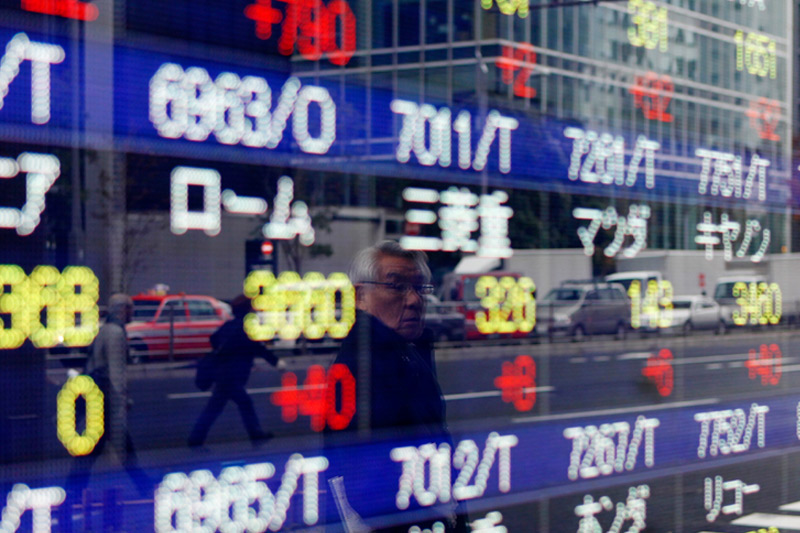Investing.com - Most Asian stocks traded lower Friday following some disappointing earnings reports from major U.S. technology companies gave traders pause about the recent rally in U.S. equities with those fears trickling over to Asia.
In Asian trading Friday, Japan’s Nikkei 225 fell 1.09% as USD/JPY fell from seven-week highs to trade below 100.
Traders are also looking toward this weekend’s elections that will decide control of Japan’s upper house of parliament. It is widely expected that Prime Minister Shinzo Abe’s Liberal Democratic Party will gain control of the upper house.
A win by the LDP could give Abe room to initiate more bold economic reforms and further depress the yen. Further yen easing could lower Japanese bond yields, forcing Japanese investors to sell those bonds in favor higher-yielding overseas assets.
Hong Kong’s Hang Seng fell 0.29%, but the Shanghai Composite rose 0.32%. Thursday after the close of U.S. markets, tech giants Google and Microsoft reported disappointing quarterly results, which sent shares of Google plunging. Technology is the largest sector weight in the S&P.
Australia S&P/ASX 200 shed 0.47% while New Zealand’s NZSE 50 inched down 0.05%. Equities in the Asia-Pacific region failed to follow through on gains notched by their U.S. counterparts following encouraging data points.
In U.S. economic news out Thursday, the U.S. Labor Department said initial claims for jobless benefits slid by 24,000 to 334,000 last week. The less volatile four-week moving average dropped by 5,250.
The Federal Reserve Bank of Philadelphia said that its manufacturing index rose 19.8 in the current month from June’s reading of 12.5. Analysts had expected the index to decline to 7.8.
Singapore’s Straits Times Index fell 0.23% while South Korea’s Kospi rose 0.20%. S&P 500 futures shed 0.21% a day after the benchmark U.S. index advanced 0.50%.
In Asian trading Friday, Japan’s Nikkei 225 fell 1.09% as USD/JPY fell from seven-week highs to trade below 100.
Traders are also looking toward this weekend’s elections that will decide control of Japan’s upper house of parliament. It is widely expected that Prime Minister Shinzo Abe’s Liberal Democratic Party will gain control of the upper house.
A win by the LDP could give Abe room to initiate more bold economic reforms and further depress the yen. Further yen easing could lower Japanese bond yields, forcing Japanese investors to sell those bonds in favor higher-yielding overseas assets.
Hong Kong’s Hang Seng fell 0.29%, but the Shanghai Composite rose 0.32%. Thursday after the close of U.S. markets, tech giants Google and Microsoft reported disappointing quarterly results, which sent shares of Google plunging. Technology is the largest sector weight in the S&P.
Australia S&P/ASX 200 shed 0.47% while New Zealand’s NZSE 50 inched down 0.05%. Equities in the Asia-Pacific region failed to follow through on gains notched by their U.S. counterparts following encouraging data points.
In U.S. economic news out Thursday, the U.S. Labor Department said initial claims for jobless benefits slid by 24,000 to 334,000 last week. The less volatile four-week moving average dropped by 5,250.
The Federal Reserve Bank of Philadelphia said that its manufacturing index rose 19.8 in the current month from June’s reading of 12.5. Analysts had expected the index to decline to 7.8.
Singapore’s Straits Times Index fell 0.23% while South Korea’s Kospi rose 0.20%. S&P 500 futures shed 0.21% a day after the benchmark U.S. index advanced 0.50%.
